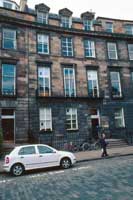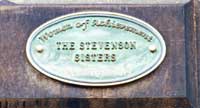The Suffragettes - Those that fought for equality
There were many suffragettes in Scotland. The movement mirrored that in England with groups representing all styles of campaigning.
Women of the late 19th Century were not only campaigning to be able to vote, but also demanding access to higher education and the professions. Many women campaigned in all areas. It was part of the same battle - equality of the sexes.
 The Stevenson sisters, Louisa, Flora and Elisa were born in Glasgow and moved to Edinburgh when their father the engineer James Stevenson retired. After he died in 1860 their house became one of the centres of women’s rights campaigning.
The Stevenson sisters, Louisa, Flora and Elisa were born in Glasgow and moved to Edinburgh when their father the engineer James Stevenson retired. After he died in 1860 their house became one of the centres of women’s rights campaigning.
They were founder members of the Ladies Educational Assn. In 1867. At that time there was no hope of gaining admission to the universities, but the classes were taught by distinguished academics at university level - complete with exams - just no formal qualification.
1870 saw the creation of the school boards and the first time that women were allowed onto government bodies. Flora was elected to Edinburgh in 1873 and was so successful that she was re-elected for 33 years until her death in 1905. The board paid a tribute by naming a new primary school after her at Comely Bank.
 Louisa campaigned specifically for women to be allowed medical training and to qualify as doctors. She joined with Sophia Jex Blake to found the women’s medical college.
Louisa campaigned specifically for women to be allowed medical training and to qualify as doctors. She joined with Sophia Jex Blake to found the women’s medical college.
Louisa and Flora were joint founders of the Edinburgh school of cookery and Domestic economy, then seen as a great innovation and step forward for women.
Both were awarded an honorary degrees by Edinburgh University in1906 and 1903.
Louisa was a member of the executive committee of the National Union of Women’s suffrage society in the 1890’s and represented the Edinburgh Society on the parliamentary committee to handle suffragette activities among MPs
 There were many doctors in the suffragette movement. One was Dr Grace Cadell. She was one on the students who left Sophia Jex Blake to join Elsie Inglis in setting up their own college. (Elsie Inglis was herself a suffragette)
There were many doctors in the suffragette movement. One was Dr Grace Cadell. She was one on the students who left Sophia Jex Blake to join Elsie Inglis in setting up their own college. (Elsie Inglis was herself a suffragette)
Grace was a member of the Women’s Freedom League. One of their slogans was “No taxation without representation” (which had been used before!). This had serious consequences for Grace as all her possessions were sold at the Mercat Cross for non payment of taxes. The movement used the event to gain maximum publicity.
